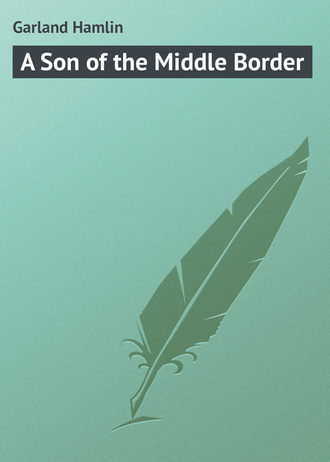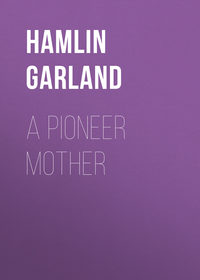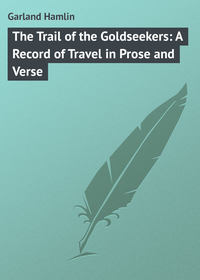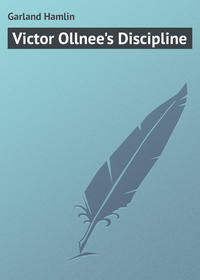 полная версия
полная версияA Son of the Middle Border
Burton continued to be my almost inseparable companion at school and whenever we could get together, and while to others he seemed only a shy, dull boy, to me he was something more. His strength and skill were remarkable and his self-command amazing. Although a lad of instant, white-hot, dangerous temper, he suddenly, at fifteen years of age, took himself in hand in a fashion miraculous to me. He decided (I never knew just why or how) – that he would never again use an obscene or profane word. He kept his vow. I knew him for over thirty years and I never heard him raise his voice in anger or utter a word a woman would have shrunk from, – and yet he became one of the most fearless and indomitable mountaineers I ever knew.
This change in him profoundly influenced me and though I said nothing about it, I resolved to do as well. I never quite succeeded, although I discouraged as well as I could the stories which some of the men and boys were so fond of telling, but alas! when the old cow kicked over my pail of milk, I fell from grace and told her just what I thought of her in phrases that Burton would have repressed. Still, I manfully tried to follow his good trail.
Corn-planting, which followed wheat-seeding, was done by hand, for a year or two, and this was a joyous task. – We "changed works" with neighbor Button, and in return Cyrus and Eva came to help us. Harriet and Eva and I worked side by side, "dropping" the corn, while Cyrus and the hired man followed with the hoes to cover it. Little Frank skittered about, planting with desultory action such pumpkin seeds as he did not eat. The presence of our young friends gave the job something of the nature of a party and we were sorry when it was over.
After the planting a fortnight of less strenuous labor came on, a period which had almost the character of a holiday. The wheat needed no cultivation and the corn was not high enough to plow. This was a time for building fence and fixing up things generally. This, too, was the season of the circus. Each year one came along from the east, trailing clouds of glorified dust and filling our minds with the color of romance.
From the time the "advance man" flung his highly colored posters over the fence till the coming of the glorious day we thought of little else. It was India and Arabia and the jungle to us. History and the magic and pomp of chivalry mingled in the parade of the morning, and the crowds, the clanging band, the haughty and alien beauty of the women, the gold embroidered housings, the stark majesty of the acrobats subdued us into silent worship.
I here pay tribute to the men who brought these marvels to my eyes. To rob me of my memories of the circus would leave me as poor as those to whom life was a drab and hopeless round of toil. It was our brief season of imaginative life. In one day – in a part of one day – we gained a thousand new conceptions of the world and of human nature. It was an embodiment of all that was skillful and beautiful in manly action. It was a compendium of biologic research but more important still, it brought to our ears the latest band pieces and taught us the most popular songs. It furnished us with jokes. It relieved our dullness. It gave us something to talk about.
We always went home wearied with excitement, and dusty and fretful – but content. We had seen it. We had grasped as much of it as anybody and could remember it as well as the best. Next day as we resumed work in the field the memory of its splendors went with us like a golden cloud.
Most of the duties of the farmer's life require the lapse of years to seem beautiful in my eyes, but haying was a season of well-defined charm. In Iowa, summer was at its most exuberant stage of vitality during the last days of June, and it was not strange that the faculties of even the toiling hay-maker, dulled and deadened with never ending drudgery, caught something of the superabundant glow and throb of nature's life.
As I write I am back in that marvellous time. – The cornfield, dark-green and sweetly cool, is beginning to ripple in the wind with multitudinous stir of shining, swirling leaf. Waves of dusk and green and gold, circle across the ripening barley, and long leaves upthrust, at intervals, like spears. The trees are in heaviest foliage, insect life is at its height, and the shimmering air is filled with buzzing, dancing forms, and the clover is gay with the sheen of innumerable gauzy wings.
The west wind comes to me laden with ecstatic voices. The bobolinks sail and tinkle in the sensuous hush, now sinking, now rising, their exquisite notes filling the air as with the sound of fairy bells. The king-bird, alert, aggressive, cries out sharply as he launches from the top of a poplar tree upon some buzzing insect, and the plover makes the prairie sad with his wailing call. Vast purple-and-white clouds move like stately ships before the breeze, dark with rain, which they drop momentarily in trailing garments upon the earth, and so pass in majesty amidst a roll of thunder.
The grasshoppers move in clouds with snap and buzz, and out of the luxurious stagnant marshes comes the ever-thickening chorus of the toads, while above them the kildees and the snipe shuttle to and fro in sounding flight. The blackbirds on the cat-tails sway and swing, uttering through lifted throats their liquid gurgle, mad with delight of the sun and the season – and over all, and laving all, moves the slow wind, heavy with the breath of the far-off blooms of other lands, a wind which covers the sunset plain with a golden entrancing haze.
At such times it seemed to me that we had reached the "sunset region" of our song, and that we were indeed "lords of the soil."
I am not so sure that haying brought to our mothers anything like this rapture, for the men added to our crew made the duties of the kitchens just that much heavier. I doubt if the women – any of them – got out into the fields or meadows long enough to enjoy the birds and the breezes. Even on Sunday as they rode away to church, they were too tired and too worried to re-act to the beauties of the landscape.
I now began to dimly perceive that my mother was not well. Although large and seemingly strong, her increasing weight made her long days of housework a torture. She grew very tired and her sweet face was often knotted with physical pain.
She still made most of our garments as well as her own. She tailored father's shirts and underclothing, sewed carpet rags, pieced quilts and made butter for market, – and yet, in the midst of it all, found time to put covers on our baseball, and to do up all our burns and bruises. Being a farmer's wife in those days, meant laboring outside any regulation of the hours of toil. I recall hearing one of the tired house-wives say, "Seems like I never get a day off, not even on Sunday," a protest which my mother thoroughly understood and sympathized with, notwithstanding its seeming inhospitality.
No history of this time would be complete without a reference to the doctor. We were a vigorous and on the whole a healthy tribe but accidents sometimes happened and "Go for the doctor!" was the first command when the band-cutter slashed the hand of the thresher or one of the children fell from the hay-rick.
One night as I lay buried in deep sleep close to the garret eaves I heard my mother call me – and something in her voice pierced me, roused me. A poignant note of alarm was in it.
"Hamlin," she called, "get up – at once. You must go for the doctor. Your father is very sick. Hurry!"
I sprang from my bed, dizzy with sleep, yet understanding her appeal. "I hear you, I'm coming," I called down to her as I started to dress.
"Call Hattie. I need her too."
The rain was pattering on the roof, and as I dressed I had a disturbing vision of the long cold ride which lay before me. I hoped the case was not so bad as mother thought. With limbs still numb and weak I stumbled down the stairs to the sitting room where a faint light shone.
Mother met me with white, strained face. "Your father is suffering terribly. Go for the doctor at once."
I could hear the sufferer groan even as I moved about the kitchen, putting on my coat and lighting the lantern. It was about one o'clock of the morning, and the wind was cold as I picked my way through the mud to the barn. The thought of the long miles to town made me shiver but as the son of a soldier I could not falter in my duty.
In their warm stalls the horses were resting in dreamful doze. Dan and Dick, the big plow team, stood near the door. Jule and Dolly came next. Wild Frank, a fleet but treacherous Morgan, stood fifth and for a moment I considered taking him. He was strong and of wonderful staying powers but so savage and unreliable that I dared not risk an accident. I passed on to bay Kittie whose bright eyes seemed to inquire, "What is the matter?"
Flinging the blanket over her and smoothing it carefully, I tossed the light saddle to her back and cinched it tight, so tight that she grunted. "I can't take any chances of a spill," I explained to her, and she accepted the bit willingly. She was always ready for action and fully dependable.
Blowing out my lantern I hung it on a peg, led Kit from her stall out into the night, and swung to the saddle. She made off with a spattering rush through the yard, out into the road. It was dark as pitch but I was fully awake now. The dash of the rain in my face had cleared my brain but I trusted to the keener senses of the mare to find the road which showed only in the strips of water which filled the wagon tracks.
We made way slowly for a few minutes until my eyes expanded to take in the faint lines of light along the lane. The road at last became a river of ink running between faint gray banks of sward, and my heart rose in confidence. I took on dignity. I was a courier riding through the night to save a city, a messenger on whose courage and skill thousands of lives depended.
"Get out o' this!" I shouted to Kit, and she leaped away like a wolf, at a tearing gallop.
She knew her rider. We had herded the cattle many days on the prairie, and in races with the wild colts I had tested her speed. Snorting with vigor at every leap she seemed to say, "My heart is brave, my limbs are strong. Call on me."
Out of the darkness John Martin's Carlo barked. A half-mile had passed. Old Marsh's fox hound clamored next. Two miles were gone. From here the road ran diagonally across the prairie, a velvet-black band on the dim sod. The ground was firmer but there were swales full of water. Through these Kittie dashed with unhesitating confidence, the water flying from her drumming hooves. Once she went to her knees and almost unseated me, but I regained my saddle and shouted, "Go on, Kit."
The fourth mile was in the mud, but the fifth brought us to the village turnpike and the mare was as glad of it as I. Her breath was labored now. She snorted no more in exultation and confident strength. She began to wonder – to doubt, and I, who knew her ways as well as I knew those of a human being, realized that she was beginning to flag. The mud had begun to tell on her.
It hurt me to urge her on, but the memory of my mother's agonized face and the sound of my father's groan of pain steeled my heart. I set lash to her side and so kept her to her highest speed.
At last a gleam of light! Someone in the village was awake. I passed another lighted window. Then the green and red lamps of the drug store cheered me with their promise of aid, for the doctor lived next door. There too a dim ray shone.
Slipping from my weary horse I tied her to the rail and hurried up the walk toward the doctor's bell. I remembered just where the knob rested. Twice I pulled sharply, strongly, putting into it some part of the anxiety and impatience I felt. I could hear its imperative jingle as it died away in the silent house.
At last the door opened and the doctor, a big blonde handsome man in a long night gown, confronted me with impassive face. "What is it, my boy?" he asked kindly.
As I told him he looked down at my water-soaked form and wild-eyed countenance with gentle patience. Then he peered out over my head into the dismal night. He was a man of resolution but he hesitated for a moment. "Your father is suffering sharply, is he?"
"Yes, sir. I could hear him groan. – Please hurry."
He mused a moment. "He is a soldier. He would not complain of a little thing – I will come."
Turning in relief, I ran down the walk and climbed upon my shivering mare. She wheeled sharply, eager to be off on her homeward way. Her spirit was not broken, but she was content to take a slower pace. She seemed to know that our errand was accomplished and that the warm shelter of the stall was to be her reward.
Holding her down to a slow trot I turned often to see if I could detect the lights of the doctor's buggy which was a familiar sight on our road. I had heard that he kept one of his teams harnessed ready for calls like this, and I confidently expected him to overtake me. "It's a terrible night to go out, but he said he would come," I repeated as I rode.
At last the lights of a carriage, crazily rocking, came into view and pulling Kit to a walk I twisted in my saddle, ready to shout with admiration of the speed of his team. "He's driving the 'Clay-Banks,'" I called in great excitement.
The Clay-Banks were famous throughout the county as the doctor's swiftest and wildest team, a span of bronchos whose savage spirits no journey could entirely subdue, a team he did not spare, a team that scorned petting and pity, bony, sinewy, big-headed. They never walked and had little care of mud or snow.
They came rushing now with splashing feet and foaming, half-open jaws, the big doctor, calm, iron-handed, masterful, sitting in the swaying top of his light buggy, his feet against the dash board, keeping his furious span in hand as easily as if they were a pair of Shetland ponies. The nigh horse was running, the off horse pacing, and the splatter of their feet, the slash of the wheels and the roaring of their heavy breathing, made my boyish heart leap. I could hardly repress a yell of delight.
As I drew aside to let him pass the doctor called out with mellow cheer, "Take your time, boy, take your time!"
Before I could even think of an answer, he was gone and I was alone with Kit and the night.
My anxiety vanished with him. I had done all that could humanly be done, I had fetched the doctor. Whatever happened I was guiltless. I knew also that in a few minutes a sweet relief would come to my tortured mother, and with full faith and loving confidence in the man of science, I jogged along homeward, wet to the bone but triumphant.
CHAPTER XIV
Wheat and the Harvest
The early seventies were years of swift change on the Middle Border. Day by day the settlement thickened. Section by section the prairie was blackened by the plow. Month by month the sweet wild meadows were fenced and pastured and so at last the colts and cows all came into captivity, and our horseback riding ceased, cut short as if by some imperial decree. Lanes of barbed wire replaced the winding wagon trails, our saddles gathered dust in the grain-sheds, and groves of Lombardy poplar and European larch replaced the tow-heads of aspen and hazel through which we had pursued the wolf and fox.
I will not say that this produced in me any keen sense of sorrow at the time, for though I missed our horse-herds and the charm of the open spaces, I turned to tamer sports with the resilient adaptability of youth. If I could not ride I could at least play baseball, and the swimming hole in the Little Cedar remained untouched. The coming in of numerous Eastern settlers brought added charm to neighborhood life. Picnics, conventions, Fourth of July celebrations – all intensified our interest, and in their increasing drama we were compensated, in some degree at least, for the delights which were passing with the prairie.
Our school-house did not change – except for the worse. No one thought of adding a tree or a vine to its ugly yard. Sun-smit, bare as a nose it stood at the cross-roads, receiving us through its drab door-way as it had done from the first. Its benches, hideously hacked and thick with grime, were as hard and uncomfortable as when I first saw them, and the windows remained unshaded and unwashed. Most of the farm-houses in the region remained equally unadorned, but Deacon Gammons had added an "ell" and established a "parlor," and Anson Burtch had painted his barn. The plain began to take on a comfortable look, for some of the trees of the wind-breaks had risen above the roofs, and growing maples softened the effect of the bleak expanse.
My mother, like most of her neighbors, still cooked and served meals in our one living room during the winter but moved into a "summer kitchen" in April. This change always gave us a sense of luxury – which is pathetic, if you look at it that way. Our front room became suddenly and happily a parlor, and was so treated. Mother at once got down the rag carpet and gave orders for us to shake out and bring in some clean straw to put under it, and when we had tacked it down and re-arranged the furniture, it was no longer a place for muddy boots and shirt-sleeved shiftlessness, it had an air of being in perpetual Sabbath leisure.
The Garlands were not so poor as all this would seem to imply, for we were now farming over three hundred acres of land and caring for a herd of cattle and many swine. It merely meant that my father did not feel the need of a "best room" and mother and Harriet were not yet able to change his mind. Harriet wanted an organ like Mary Abby Gammons, mother longed for a real "in-grain" carpet and we all clamored for a spring wagon. We got the wagon first.
That bleak little house is clearly defined in my mind at this moment. The low lean-to kitchen, the rag-carpeted sitting room with its two chromos of Wide Awake and Fast Asleep– its steel engraving of General Grant, and its tiny melodeon in the corner – all these come back to me. There are very few books or magazines in the scene, but there are piles of newspapers, for my father was an omnivorous reader of all things political. It was not a hovel, it was a pioneer cabin persisting into a settled community, that was all.
During these years the whole middle border was menaced by bands of horse-thieves operating under a secret well-organized system. Horses disappeared night by night and were never recovered, till at last the farmers, in despair of the local authorities, organized a Horse Thief Protective Association which undertook to pursue and punish the robbers and to pay for such animals as were not returned. Our county had an association of this sort and shortly after we opened our new farm my father became a member. My first knowledge of this fact came when he nailed on our barn-door the white cloth poster which proclaimed in bold black letters a warning and a threat signed by "the Committee." – I was always a little in doubt as to whether the horse-thieves or ourselves were to be protected, for the notice was fair warning to them as well as an assurance to us. Anyhow very few horses were stolen from barns thus protected.
The campaign against the thieves gave rise to many stirring stories which lost nothing in my father's telling of them. Jim McCarty was agent for our association and its effectiveness was largely due to his swift and fearless action. We all had a pleasant sense of the mystery of the night riding which went on during this period and no man could pass with a led horse without being under suspicion of being either a thief or a deputy. Then, too, the thieves were supposed to have in every community a spy who gave information as to the best horses, and informed the gang as to the membership of the Protective Society.
One of our neighbors fell under suspicion at this time and never got clear of it. I hope we did him no injustice in this for never after could I bring myself to enter his house, and he was clearly ostracized by all the neighbors.
As I look back over my life on that Iowa farm the song of the reaper fills large place in my mind. We were all worshippers of wheat in those days. The men thought and talked of little else between seeding and harvest, and you will not wonder at this if you have known and bowed down before such abundance as we then enjoyed.
Deep as the breast of a man, wide as the sea, heavy-headed, supple-stocked, many-voiced, full of multitudinous, secret, whispered colloquies, – a meeting place of winds and of sunlight, – our fields ran to the world's end.
We trembled when the storm lay hard upon the wheat, we exulted as the lilac shadows of noon-day drifted over it! We went out into it at noon when all was still – so still we could hear the pulse of the transforming sap as it crept from cool root to swaying plume. We stood before it at evening when the setting sun flooded it with crimson, the bearded heads lazily swirling under the wings of the wind, the mousing hawk dipping into its green deeps like the eagle into the sea, and our hearts expanded with the beauty and the mystery of it, – and back of all this was the knowledge that its abundance meant a new carriage, an addition to the house or a new suit of clothes.
Haying was over, and day by day we boys watched with deepening interest while the hot sun transformed the juices of the soil into those stately stalks. I loved to go out into the fairy forest of it, and lying there, silent in its swaying deeps, hear the wild chickens peep and the wind sing its subtle song over our heads. Day by day I studied the barley as it turned yellow, first at the root and then at the neck (while the middle joints, rank and sappy, retained their blue-green sheen), until at last the lower leaves began to wither and the stems to stiffen in order to uphold the daily increasing weight of the milky berries, and then almost in an hour – lo! the edge of the field became a banded ribbon of green and yellow, languidly waving in and out with every rush of the breeze.
Now we got out the reaper, put the sickles in order, and father laid in a store of provisions. Extra hands were hired, and at last, early on a hot July morning, the boss mounted to his seat on the self-rake "McCormick" and drove into the field. Frank rode the lead horse, four stalwart hands and myself took "stations" behind the reaper and the battle was on!
Reaping generally came about the 20th of July, the hottest and dryest part of the summer, and was the most pressing work of the year. It demanded early rising for the men, and it meant an all day broiling over the kitchen stove for the women. Stern, incessant toil went on inside and out from dawn till sunset, no matter how the thermometer sizzled. On many days the mercury mounted to ninety-five in the shade, but with wide fields all yellowing at the same moment, no one thought of laying off. A storm might sweep it flat, or if neglected too long, it might "crinkle."
Our reaper in 1874 was a new model of the McCormick self-rake, – the Marsh Harvester was not yet in general use. The Woods Dropper, the Seymour and Morgan hand-rake "contraptions" seemed a long way in the past. True the McCormick required four horses to drag it but it was effective. It was hard to believe that anything more cunning would ever come to claim the farmer's money. Weird tales of a machine on which two men rode and bound twelve acres of wheat in ten hours came to us, but we did not potently believe these reports – on the contrary we accepted the self-rake as quite the final word in harvesting machinery and cheerily bent to the binding of sheaves with their own straw in the good old time-honored way.
No task save that of "cradling" surpassed in severity "binding on a station." It was a full-grown man's job, but every boy was ambitious to try his hand, and when at fourteen years of age I was promoted from "bundle boy" to be one of the five hands to bind after the reaper, I went to my corner with joy and confidence. For two years I had been serving as binder on the corners, (to keep the grain out of the way of the horses) and I knew my job.
I was short and broad-shouldered with large strong hands admirably adapted for this work, and for the first two hours, easily held my own with the rest of the crew, but as the morning wore on and the sun grew hotter, my enthusiasm waned. A painful void developed in my chest. My breakfast had been ample, but no mere stomachful of food could carry a growing boy through five hours of desperate toil. Along about a quarter to ten, I began to scan the field with anxious eye, longing to see Harriet and the promised luncheon basket.









